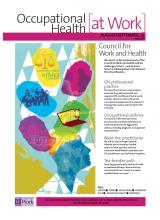August/September 2015 (vol. 12/2)
ContentsFeaturesNewsLegal
NewsResearch DigestResearch PlusCPD
Research Plus
RTW from depressive and anxiety disorders
Sustained return to work (RTW) – defined as being employed and not having been sick-listed for more than 14 days in the previous six months – from depressive or anxiety disorders is influenced by psychosocial factors rather than characteristics of the illness, this longitudinal cohort study of working-age people in the Netherlands finds. A total of 215 workers previously diagnosed with anxiety or depression were sick-listed at the start of the study. Just over half (52%) had a sustained RTW after two years. Younger age (p = 0.02), higher net household income (p = 0.04), and employment status (p < 0.05) were all positively associated with sustainable RTW, but none of the disorder-related factors (eg co-morbidity, severity, duration or treatments) were significant. Being on sickness benefits at the start of the study reduced the chances of sustainable RTW by more than 60% compared with those respondents who were employed or self-employed (OR = 0.39; CI 0.20–0.77).
Occupational Health at Work August/September 2015 (vol. 12/2) pp40



